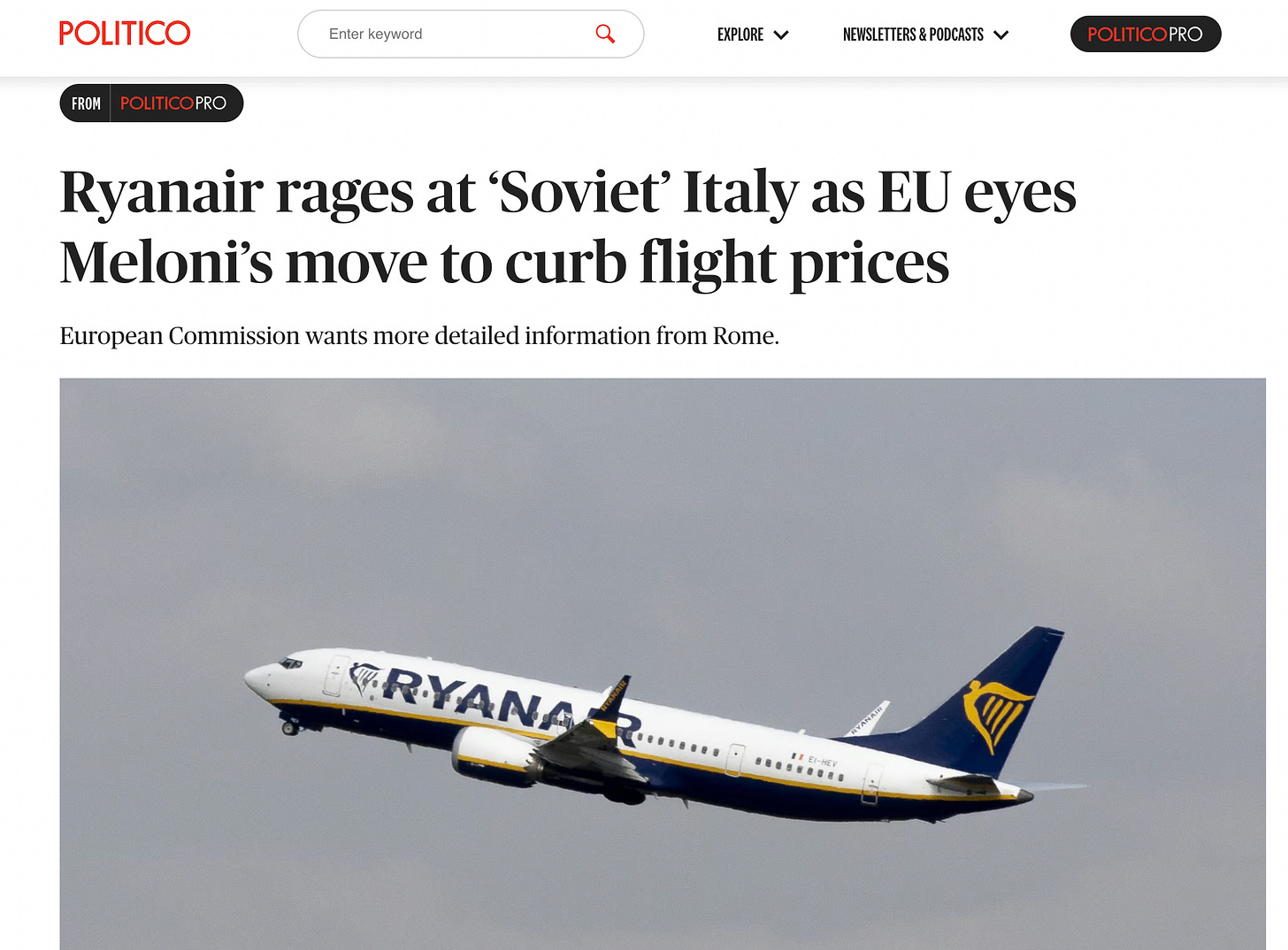Something strange and unsettling happened this summer for anyone with progressive leanings. Giorgia Meloni’s administration - vulgar, incompetent and socially abhorrent as it is - put forward some half-decent proposals. First, just before the recess, the government announced a surprise windfall tax on banks. Overnight, the state declared it would take a 40% cut from surplus “unjust” profits to help support families in need. Leaving aside the bigger picture - parallel cuts to welfare, a preference for tax cuts over public spending - this was, in itself, a bold move. While the government was ultimately forced to backtrack due to intimidation by the EC and other international bodies, the proposal represents one of the most radical challenges to neoliberalism that Italy’s seen for decades. The same day, fuelled by a similar defiant spirit, Meloni announced she will enforce a price cap on domestic flights to prevent companies like Ryanair and EasyJet hiking fees last minute, thereby “exploiting” the public without paying their fair due in tax. The details - here - are more complex, but the basic point seems reasonable to me. Why shouldn’t the Italian state have the power to establish these kinds of measures? Since when were Michael O’Leary’s profits more important than the broader public interest at a time of high inflation? As a politician, Meloni is indefensible. But I have to admit, watching her being pummelled by international regulators for proposing two perfectly reasonable policies has been discombobulating. If you’re still wondering why voters continue to support this administration: well this is (part of) the answer.

Right now, over 6732 migrants are being held in a cramped containment camp on the small island of Lampedusa, with little access to food, water or sanitary supplies. Yesterday afternoon, the situation reached breaking point. Around 14.00, as a Red Cross delegation entered the camp, dozens of men and women began shouting at the staff, demanding humane treatment and basic goods. The Guardia di Finanza - the riot police - responded by charging at the assembled, using their shields as battering rams. Scenes like this are horrific, disturbing, inhuman. They also speak to a failure of politics and policy. Crossings in the central Mediterranean are up 60% on last year, and 30,000 more people are expected to make the journey before the end of October. Meloni - paralysed - has been reverting to her usual, impotent and overly simplistic soundbite: “we need to find a way to stop them arriving!” but the problem is certainly more complex than that. Of course, nobody’s hands are exactly clean here. Earlier this week, as a case in point, Germany’s green socialist government announced that despite the current emergency, it will not be accepting any more asylum seekers from Italy. What can you say to that? While the far-right is openly calling for gunboat patrols, Europe’s “sensible” democrats are themselves, once again, retreating into nationalism and bigotry. While Meloni offers venomous hate speech, Scholz offers lies and hypocrisy. EU solidarity is nowhere to be seen. In the meantime, tragically, the emergency continues with no end in sight.
It’s finally happened: this week, the municipality of Venice voted to approve a long mooted entrance fee which, as of 2024, will require non-residents to display a ticket upon entry to the city. Starting next spring, visitors to Venice of all kinds will be asked to purchase a five euro QR code from a dedicated digital portal in order spend time in La Serenessima. Those without the code will face a fine of up to 50 euros. To be clear: this experiment is still in a trial phase. The local authorities will be introducing checks next Easter, focusing in particular on the subsequent weekends and holidays. While the authorities claim they hope to raise money for public transport and to prop up the city’s economy, critics fear this new revenue will end up in the usual pockets, and that visitor numbers will remain largely unaffected. Whatever your own take, in a city where tourist beds now outnumber locals - for the first time in history - it’s clear that more targeted legislation is needed to give residents of Venice control over their city and their lives.
Arts and culture: in trash we trust
Finally, a new Italian novel in English translation that’s actually worth checking out! It’s been a while since I shared any fiction here. After a couple of years of strong releases by Elena Ferrante, Domenico Starnone and others the book market has been devoid of new Italian voices for a while now. Last month, however, a new title began attracting international critics’ attention. Veronica Raimo’s Lost On Me [Niente di Vero] was a huge hit when it was first released here back in 2019. The book, a contemporary feminist bildungsroman, tells the story of Verika, a young woman growing up in Rome in the 80s who has some strong feelings to share regarding her family, friends and neighbours. This is a funny, rage-filled, wry, dark novel about sexual assault, abortion and patriarchal violence; it’s a philosophical book about writing, in the tradition of Borges or Calvino. Just as importantly, it’s also a real romp of a read with plenty of sex drugs and rock and roll. I found this a blast in the original Italian, and Leah Janeczko’s Americanised slang-filled translation seems a neat way of capturing that essence for international readers. If you like Claudia Durustanti or Deborah Levy, or even Sally Rooney for that matter, this will probably be up your street. Buy it straight from the publisher here.
This week the Italian culture pages have been talking about one thing and one thing only: the return of Grande Fratello (aka Big Brother). First, a disclaimer: I am not a Big Brother fan. In fact I can think of few worse ways to pass my time than observing a bunch of narcissistic C-list wannabes humiliating themselves in a carefully scripted, boring, reality show. I wouldn’t be flagging this story at all if it weren’t for one reason: this is the first show that Pier Silvio Berlusconi - son of Silvio - has taken executive control over. His goal, according to interviews, is to cleanse the Mediaset brand of the “excess” that has characterised it for so long and instead cash-in on “nostalgia” and “other new sentiments”. Big Brother is, apparently, a “trial” for this new comms strategy. But what will it mean in practice? Well, first-off don’t expect any Vlogggers or Gen-Z Tik-Tokkers here. This year’s participants are comprised of a mix of “real (aging) celebrities” and “ordinary (younger) people”. One half are VIPs from the sport and fashion world; the other half are “totally unknown.” The political optics are also intriguing. According to Berlusconi, the show will be pro LGBTQI+ [though beyond featuring gay participants it remains to be seen what that could mean]. At the same time, I couldn’t help notice - from the five minutes I managed to sit through - that the casting directors have positioned Giselda Torresan, a female, leftist, activist with a funny accent as the obvious comic villain for this season. There’s something utterly banal about Big Brother itself. But Mediaset is still one of the most influential media companies in the world. Like it or not, watching the company enter its new, post-Silvio era is, for Italians, a moment of national importance.

Recipe of the week: lemon tiramisu
Tiramisu is one of Italy’s most iconic dolci, and for good reason. Made properly, this elegant 80s sponge cake is a divine bitter-sweet, indulgent, slightly boozy treat. Nevertheless, after years of eating the stuff, you can find yourself wanting a change. This summer - in Amalfi - I discovered my personal new favourite variation. The tiramisù al limone. This dish cropped up in Campania about a decade ago, as the region’s answer to the Veneto crowd pleaser. It is, in realty, a reinterpretation of the local delizia al limone: made of savoiardi biscuits, marscapone, egg whites, lemon zest and (sometimes) a dash of limoncello. There’s nothing fancy here; this isn’t a show stopper. It’s a simple, satisfying low key dessert that makes a delicious end to a light summer meal. Caffeine free and nicely balanced by the citrus, this is a winner in my book. Here’s a link to a stripped down, classic version [ITA only], plus a more decadant international variation using rich lemon curd.
About Me
My name is Jamie Mackay (@JacMackay) and I’m an author, editor and translator based in Florence. I’ve been writing about Italy for a decade for international media including The Guardian, The Economist, Frieze, and Art Review. I launched ‘The Week in Italy’ to share a more direct and regular overview of the debates and dilemmas, innovations and crises that sometimes pass under the radar of our overcrowded news feeds.
If you enjoyed this newsletter I hope you’ll consider becoming a supporter for EUR 5.00 per month (the price of a weekly catch-up over an espresso). Alternatively, if you’d like to send a one-off something, you can do so via PayPal using this link. No worries if you can’t chip-in or don’t feel like doing so, but please do consider forwarding this to a friend or two. It’s a big help!




